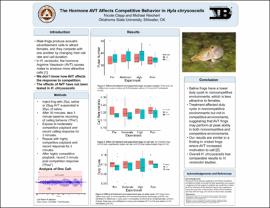| dc.contributor.advisor | Reichert, Michael | |
| dc.contributor.author | Clapp, Nicole | |
| dc.contributor.other | Wentz Research Scholars | |
| dc.date.accessioned | 2020-07-07T14:46:27Z | |
| dc.date.available | 2020-07-07T14:46:27Z | |
| dc.date.issued | 2020-04-24 | |
| dc.identifier | oksd_Wentz_2020_clapp | |
| dc.identifier.citation | Clapp, N., & Reichert, M. (2020, April 24). The hormone AVT affects competitive behavior in Hyla chrysoscelis. Poster session presented at the Oklahoma State University Wentz Research Scholars Symposium, Stillwater, OK. | |
| dc.identifier.uri | https://hdl.handle.net/11244/324950 | |
| dc.description.abstract | Hormones play an important role in animal social behavior, including competitive behaviors. Previous studies demonstrate that the hormone Arginine Vasotocin (AVT) modulates the calling behavior of different frog species. Male frogs produce acoustic advertisement calls to attract females and compete with one another by increasing their call rate and call duration. Previously, AVT has been shown to correlate with increased call rate and call duration; however, how competition influences this relationship remains unknown. We investigated how the effects of AVT would be impacted by different competitive environments in the gray treefrog Hyla chrysoscelis. We predicted that increased competition would further amplify the effects of AVT on call rate and call duration. Frogs were caught and injected with either a saline control (n=14) or AVT (n=23) and then sequentially exposed to noncompetitive, moderately competitive, and highly competitive environments via playbacks of synthetic calls with differing call rates and durations. Frogs injected with AVT had higher call rates but no change in call duration. AVT frogs also had higher duty cycles in noncompetitive environments, suggesting that AVT may offer reproductive benefits in noncompetitive environments, but that these benefits are lost in competitive environments. This data provides insight on how AVT influences behavior, which has important implications for the overall competitiveness of the individual and the individual's subsequent reproductive success. | |
| dc.description.sponsorship | Lew Wentz Foundation | |
| dc.format | application/pdf | |
| dc.language | en_US | |
| dc.publisher | Oklahoma State University | |
| dc.rights | In the Oklahoma State University Library's institutional repository this paper is made available through the open access principles and the terms of agreement/consent between the author(s) and the publisher. The permission policy on the use, reproduction or distribution of the article falls under fair use for educational, scholarship, and research purposes. Contact Digital Resources and Discovery Services at lib-dls@okstate.edu or 405-744-9161 for further information. | |
| dc.title | Hormone AVT affects competitive behavior in Hyla chrysoscelis | |
| osu.filename | oksd_Wentz_2020_clapp.pdf | |
| dc.description.department | Integrative Biology | |
| dc.type.genre | Presentation | |
| dc.type.material | Text | |
| dc.subject.keywords | avt | |
| dc.subject.keywords | hormones | |
| dc.subject.keywords | frogs | |
| dc.subject.keywords | endocrinology | |
| dc.subject.keywords | animal behavior | |
